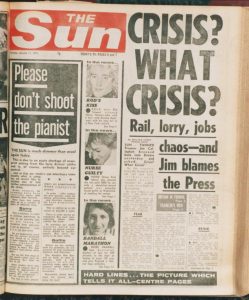Not so long ago the great John Cleese took to social media to express the opinion that London was “no longer an English city.”

For this, of course, he was lambasted by the usual suspects – in modern Britain, freedom of speech is allowed only to those whose thoughts left-wing liberals would approve of.
However, as he subsequently posted, his friends appear to agree with him, which is probably more important to him, and quite rightly so.
I can trace my own family history back to Shadwell, in East London, to the 18th century (for the victims of Britain’s comprehensive education system, that is the “1700s”). It is no longer a district I would feel safe in.
And so, as much as I miss the old East End, which has changed out of all recognition in recent decades, there is nothing for me in “the Smoke” now.
And if indigenous Londoners feel that our capital city has gone into decline under the ghastly Mayor Sadiq “Genghis” Khan, you ain’t seen nothing yet. Just wait and see what happens when Khan has a like-minded soul in number 10!
Which leads me onto the main topic of this missive
Many have been predicting that a Labour victory in the coming General Election will lead to an exodus of foreign investment in the UK.
The thought of Keir Starmer, a man who makes John Major look positively charismatic by comparison, taking up office in 10 Downing Street is enough to make anybody consider upping sticks.
And already, even before the first vote is cast and the first new taxes are announced, the exodus is underway.
The Daily Mail has published claims that a “brain drain” has already begun, with high earners fleeing the country ahead of Labour’s inevitable tax increases.
Times Higher Education noted the phenomenon earlier this year, largely blaming Brexit.
A “flood” of Britain’s teachers have are now on the move, largely enticed by better pay and better weather, according to The Times.
Winter of Discontent

All of this replicates what happened in the 1970’s, a grim period which culminated in the “winter of discontent” (1978-79), during Labour Prime Minister James Callaghan’s time in Downing Street.
At that time, the top rate of income tax was a staggering 83% (the highest rate in the UK is currently 45%).
If a person on the higher rate at that time were to invest in British business, creating jobs and enterprise, they would have also been liable to an extra 15% “unearned income” surtax, taking their tax rate to 98%.
Many simply left the country, taking their money and their skills with them.
During the period in question the suicide rate for males, which had been in decline until 1975, sharply rose. This increase coincided precisely with a significant rise in unemployment, a trend that continued until 1978.
Callaghan calls in the troops
The Labour Party has its roots in the trade union movement, and therefore is always reluctant to challenge the union leaders.
In 1977, on Callaghan’s watch, Britain’s first ever fireman’s strike took place, resulting in the Army and Royal Air Force being drafted in.
With minimal training they took to the streets in the antiquated “Green Goddess” fire engines, taken from a reserve set aside as part of Britain’s civil defence contingency.
When their water tanks were full, the Green Goddesses had a tendency to tip over whilst going around corners, a characteristic that lead to the deaths of two soldiers of the Royal Irish Rangers, killed when their appliance overturned on an emergency call in Manchester,
Despite all this the servicemen who had not even been issued with breathing apparatus – the Labour Government would not allow them to use modern equipment – did a superb job.
According to a 1978 House of Lords review, “in London only 100 green goddesses coped with the same number of fires in an area that is normally covered by 600 modern appliances.”
As further strikes spread across the country, gravediggers downed tool and bodies remained unburied. Refuse was not collected for some weeks as the bin-men went on strike.
Lorry driver strikes led to shortages on supermarket shelves and more than a million UK workers were laid off temporarily during the disputes.
And if we think inflation is bad now – it hit a high of 7.9% in June of last year, and is currently at 2% – remember that in 1975 under Harold Wilson’s Labour government it was running at a staggering 25%!
Two years later it was still at16%.
Déjà vu
What households have experienced over the last two years is nothing to what they might expect under Keir Starmer, who will take charge of a Britain that is showing striking similarities with the past.
In real terms, wages in the UK are below where they were two decades ago, whilst energy bills went up 80 percent in 2022, and show no signs of coming down.
The UK unemployment rate for the first quarter of 2024 (4.3%) was above estimates, and is increasing.
Suicide rates are currently at a low, just as was the case in 1975, before James Callaghan took office, as previously mentioned.
Starmer recently met with the leaders of the 11 trade unions affiliated to the Labour Party at party headquarters in London.
During the meeting he offered the unions a number of changes: an Employment Rights Bill which would make it illegal for companies to fire their workers only to rehire them on worse pay and conditions, a ban on zero-hours contracts, and equal legal status for all workers.
Apparently this was not enough for the Union leaders. It never is, as the British people are likely to find out quite soon.
Click here for more News & Current Affairs at EU Today
_________________________________________________________________________________________________________

Follow EU Today on social media:
Twitter: @EU_today
Facebook: https://www.facebook.com/EUtoday.net/
YouTube: https://www.youtube.com/@eutoday1049


